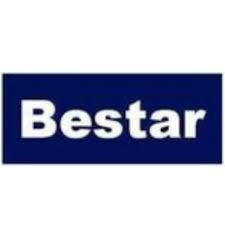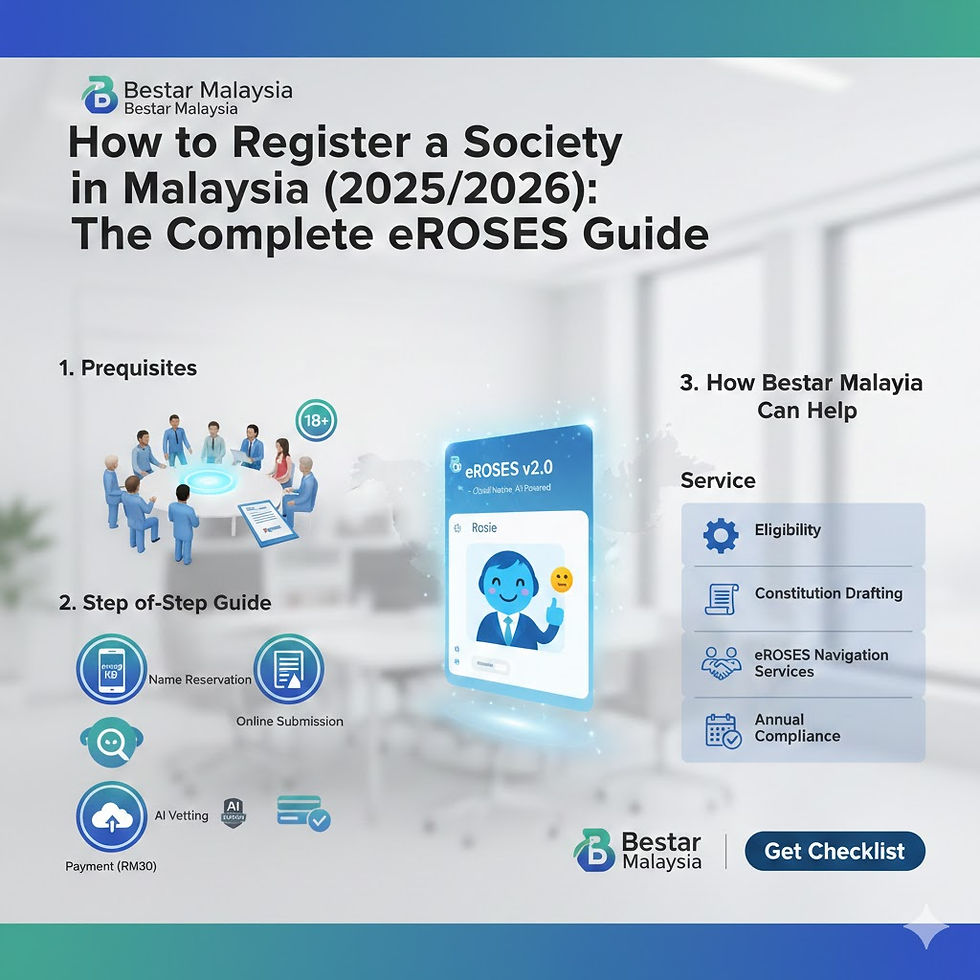E-Hailing Company Setup in Malaysia
- Roger Pay
- Jun 10, 2025
- 6 min read

E-Hailing Company Setup in Malaysia
Setting up an e-hailing company in Malaysia involves navigating a clear regulatory framework established by the Ministry of Transport (MoT) and primarily enforced by the Land Public Transport Agency (APAD), formerly known as SPAD. This framework regulates both e-hailing operators and drivers to ensure safety, fairness, and a level playing field with the traditional taxi industry.
Here's a breakdown of the key steps and requirements:
I. For the E-Hailing Company (Operator):
Business Registration:
You must register your company with the Companies Commission of Malaysia (SSM) or the Cooperative Commission of Malaysia (SKM). Common business entities include Sole Proprietorship, Partnership/LLP, or Private/Public Limited Company (Sdn. Bhd. or Berhad). A Sdn. Bhd. is a common choice for businesses.
Ensure you have a Malaysian business address and a corporate bank account.
Register for company tax with the Inland Revenue Board of Malaysia (LHDN).
Intermediation Business Licence (IBL):
This is the core license for e-hailing operators. You must apply for it with APAD.
Minimum Capital: A minimum capital of RM100,000 is generally required.
Board Member: At least one board member must be a Malaysian citizen and permanent resident.
Conditions: The IBL allows APAD to impose conditions to regulate the operator, including ensuring standards and safety measures.
Compliance: You must ensure that all drivers operating under your platform comply with regulations, including valid E-hailing Vehicle Permits (EVPs) and Public Service Vehicle (PSV) licenses for their vehicles and themselves. Recent reports indicate strict enforcement against companies found in violation of these conditions.
Technology and Infrastructure:
Develop a user-friendly mobile application for both passengers (booking, payment, tracking) and drivers (receiving requests, tracking earnings, navigation).
Invest in robust technology for secure data management, GPS tracking, and customer support systems.
Operational Requirements & Safety Measures:
Driver & Vehicle Standards: You are responsible for ensuring that all drivers and vehicles on your platform meet the stipulated standards. This includes:
Background checks (criminal records and medical checks) for drivers.
Ensuring drivers are not blacklisted by JPJ (Road Transport Department) or PDRM (Royal Malaysia Police).
Vehicles must undergo annual inspections at Computerized Vehicle Inspection Centers (PUSPAKOM) if they are more than 3 years old. Vehicles older than 10 years are generally not permitted for e-hailing services.
Vehicles should have a minimum three-star ASEAN NCAP rating and a seating capacity of 4 to 11 persons (including the driver).
Insurance: Operators must ensure drivers have e-hailing add-on insurance, which is separate from private motor insurance and covers e-hailing jobs.
Driver Incentives: Consider offering incentives to attract and retain drivers, encouraging good service and professionalism.
Customer Support: A strong customer support system is crucial to address any issues or concerns from both passengers and drivers.
II. For E-Hailing Drivers (Under the Operator):
While the company is the operator, it's essential to understand the requirements for individual drivers as the operator is responsible for ensuring their compliance:
Eligibility:
Malaysian citizen (Blue MyKad).
Aged 21 years old and above.
Possess a valid Competent Driving License (CDL) of Class D or DA (P-license is not accepted) for at least one year.
No existing medical conditions that may render them unfit to drive.
Clean criminal record and not blacklisted by JPJ or PDRM.
Public Service Vehicle (PSV) License:
This vocational driving license is mandatory for all e-hailing drivers.
Medical Check-up: Drivers must undergo a medical check-up using the JPJL8A form.
PSV Training: Attend a compulsory 6-hour PSV course at a driving institute.
PSV Test: While some information suggests the examination has been abolished, the PSV license still involves a test component on road safety (similar to taxi drivers).
Application: Submit the application to JPJ. The PSV license needs to be renewed yearly.
E-Hailing Vehicle Permit (EVP):
This permit is issued by APAD for the vehicle used for e-hailing services.
The vehicle must be a private vehicle owned by a Malaysian citizen or Permanent Resident (company-owned vehicles are generally rejected).
Vehicles must be less than 15 years old.
The driver's name must be stated in the e-hailing insurance cover note.
E-Hailing Insurance:
Mandatory add-on insurance for e-hailing purposes, providing coverage for driver, passenger, and third parties during e-hailing jobs.
Vehicle Inspection (PUSPAKOM):
Vehicles 3 years old and above must undergo an annual inspection at PUSPAKOM to ensure they meet safety and environmental standards.
Vehicles older than 10 years are not permitted.
Decal Display:
E-hailing vehicles must display a decal issued by JPJ when carrying passengers.
SOCSO Contribution:
E-hailing drivers are required to contribute to the Social Security Organization (SOCSO) under the Self-Employment Social Security Scheme.
Safety Equipment:
Drivers must have safety equipment, such as a fire extinguisher, ready to use in their cars.
Important Considerations:
Staying Updated: The e-hailing industry in Malaysia is subject to ongoing regulatory updates and enforcement. It's crucial to stay informed about the latest requirements from APAD and the Ministry of Transport.
Competition: The e-hailing market in Malaysia is competitive, with established players like Grab and local alternatives. Consider your unique selling proposition, pricing strategy, and user experience.
Innovation: Continuously improving services and embracing innovation can help you stay ahead in the market.
It is highly recommended to consult with accounting professionals and relevant government agencies (APAD, SSM, JPJ) in Malaysia for the most up-to-date and specific guidance when setting up an e-hailing company.
How Bestar can Help
E-Hailing Company Setup in Malaysia
Setting up an e-hailing company in Malaysia, as detailed previously, involves navigating a complex landscape of corporate, transport, and technology regulations. Bestar plays a critical role in every stage of this process, providing invaluable guidance to ensure compliance, mitigate risks, and establish a solid foundation for the business.
Here's how Bestar can help:
1. Corporate & Business Registration:
Company Formation: Advising on the most suitable legal structure for the e-hailing company (e.g., Sdn. Bhd. for limited liability and scalability), drafting the Memorandum and Articles of Association (M&A) or constitutive documents, and assisting with registration at the Companies Commission of Malaysia (SSM).
Shareholder Agreements: Drafting comprehensive shareholder agreements to govern the rights, responsibilities, and relationships among founders and investors, including provisions for funding, profit sharing, and dispute resolution.
Tax Registration: Guiding on tax registration with the Inland Revenue Board of Malaysia (LHDN) and advising on corporate tax implications relevant to a tech-based service industry.
2. Regulatory Compliance (E-Hailing Specific):
Intermediation Business Licence (IBL): This is the most crucial aspect. Bestar will:
Interpret Regulations: Provide clear interpretations of the Land Public Transport Act 2010 (Act 715), the Commercial Vehicles Licensing Board Act 1987 (Act 334), and all relevant subsidiary legislation and guidelines issued by APAD (Land Public Transport Agency).
Application Preparation: Assist in preparing and submitting the extensive documentation required for the IBL application, ensuring all conditions (e.g., minimum capital, board member requirements) are met.
Liaison with APAD: Act as a liaison with APAD, addressing any queries or requests for further information during the application process.
Compliance Framework: Develop internal compliance frameworks and policies for the company to ensure ongoing adherence to all IBL conditions and APAD directives.
Driver & Vehicle Compliance: Advise the e-hailing company on its obligations to ensure drivers and vehicles on its platform comply with requirements such as:
PSV License: Understanding the requirements for drivers to obtain their Public Service Vehicle (PSV) license, including medical checks, training, and testing.
E-Hailing Vehicle Permit (EVP): Guiding on the process for drivers to obtain their EVP from APAD.
Vehicle Inspections (PUSPAKOM): Explaining the PUSPAKOM inspection requirements and the age limits for e-hailing vehicles.
E-Hailing Insurance: Ensuring the company has a mechanism to verify drivers have the mandatory e-hailing add-on insurance.
SOCSO Contributions: Advising on the company's role in ensuring drivers contribute to SOCSO under the Self-Employment Social Security Scheme.
Data Protection & Privacy:
Personal Data Protection Act 2010 (PDPA): Advising on compliance with Malaysia's PDPA, especially concerning the collection, storage, use, and disclosure of personal data of both passengers and drivers. This includes drafting privacy policies and terms of service.
Cybersecurity: Providing guidance on cybersecurity best practices and legal requirements to protect sensitive data from breaches.
3. Contract Drafting & Review:
Driver Agreements: Drafting clear and legally sound contracts between the e-hailing company and its drivers, defining the terms of engagement, responsibilities, compensation structure, and termination clauses. This is crucial given the gig economy nature of e-hailing and the potential for misclassification of drivers.
User Agreements (Terms of Service): Drafting comprehensive terms and conditions for passengers using the e-hailing platform, covering booking procedures, payment terms, cancellation policies, liability disclaimers, and dispute resolution mechanisms.
Third-Party Contracts: Reviewing and drafting agreements with payment gateways, mapping service providers, insurance companies, and other technology or service partners.
4. Intellectual Property (IP) Protection:
Trademark Registration: Assisting with the registration of the company's brand name, logo, and other distinctive marks with the Intellectual Property Corporation of Malaysia (MyIPO).
Copyright Protection: Advising on the protection of the e-hailing app's software, code, and content under copyright law.
Confidentiality & Non-Disclosure Agreements (NDAs): Drafting NDAs to protect proprietary technology, business strategies, and sensitive information shared with partners or employees.
5. Employment & Labour Law (for internal staff):
Employment Contracts: Drafting employment contracts for the company's full-time staff, ensuring compliance with the Employment Act 1955 and other relevant labour laws.
Human Resources Policies: Advising on HR policies, employee benefits, and termination procedures.
In essence, Bestar acts as crucial navigators, ensuring that the e-hailing company establishes itself legally, operates compliantly, protects its interests, and effectively manages its relationships with drivers, passengers, and regulators within the dynamic Malaysian market. Our expertise helps to avoid costly legal pitfalls and build a sustainable business.



Comments